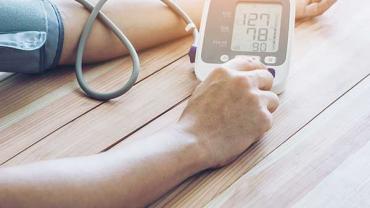
Hypertension is a major risk factor for cardiovascular disease. According to the Centers for Disease Control, nearly 32 percent of all American adults have hypertension and another 30 percent have pre-hypertension. Further, only about 54 percent of those with hypertension actually have it controlled, meaning the other half are at risk for joining the 1,110 deaths that occur each day as a result of their blood pressure.
Currently, hypertension is defined as systolic pressure greater or equal to 140 mmHg and/or diastolic pressure greater or equal to 90 mmHg. Prehypertension is defined as systolic pressure between 120 and 139 mmHg and/or diastolic pressure between 80 and 89 mmHg.
Sleep quality and quantity have a direct impact on blood pressure. Our modern lifestyles have forced us to accept and function on shorter and shorter amounts of sleep, leaving many of us deprived of adequate sleep and fueling our days with caffeine and sugar. Few recognize that they are sleep deprived until years later when the effects start to appear, including high blood pressure.
So, how much impact can sleep duration have upon blood pressure? More than we would care to admit. In a meta-analysis (published in 2015) of both cross-sectional and prospective cohort studies that included a total of 347,759 participants over the age of 18 years, it was shown that both excessively long and short periods of sleep duration are risk factors for hypertension. Sleep duration was measured by groups that included less than 5 hours, 6 hours, 7 hours, 8 hours, and over 9 hours of sleep. The pooled odds ratio (OR) for comparisons were as follows (all results had 95% confidence intervals):
In all groups, the impact of sleep duration on risk of hypertension was greater among women than men.
In a more recent prospective study (published in 2017), 1715 Korean adults aged 40 to 70 years were followed for 2.6 years after being stratified into categories of sleep duration that included less than 6 hours, 6 to 7.9 hours, 8-9.9 hours, and greater than 10 hours of sleep. The odds ratio for newly developed hypertension in those who obtained less than 6 hours of sleep, compared to those who received 6 to 7.9 hours, was 1.71 (95% confidence interval). Sleep duration greater than 8 hours did not seem to significantly impact the incidence of hypertension in this study.
Finally, in a cross-sectional study published in 2019 and involving 19,407 adults aged 18 to 79 years, the overall prevalence of hypertension was 32.6 percent (congruent with current statistics) and higher among those who obtained less than 7 hours of sleep, compared to those who received 7 to 8 hours each day. No association was found between sleep duration and the risk of hypertension among the last test group, which slept 8 or more hours.
There are many theories regarding the mechanism behind sleep and blood pressure. One theory focuses on sympathetic activation. During normal sleep, the vagal system (“rest and digest” system) is activated and the production of catecholamines is decreased. Blood pressure is reduced by 10 percent or more during normal sleep. This phenomenon is known as the ‘nocturnal dip.’ The supine position and muscle relaxation experienced during sleep also aid in helping the blood pressure drop. Sleep deprivation, however, is interpreted as a stressor to the body. It activates the sympathetic nervous system, increases the production of catecholamines, and stimulates the rennin-angiotensin-aldosterone system. A direct effect of these activities is blood vessel constriction and an increase in blood pressure.
Sleep deprivation has also been shown to restrict arterial flow-mediated dilation and decrease intracellular concentrations of magnesium. Magnesium not only decreases vascular tone and promotes vascular relaxation, but it also enhances muscular relaxation, both of which impact blood pressure.
As the prevalence of hypertension rises, sleep deprivation is one factor that can be assessed and easily manipulated to encourage lowering blood pressure without pharmaceutical intervention. Thus far, the studies seem to support the importance of sleeping no less than 7 hours to maintain a healthy blood pressure.